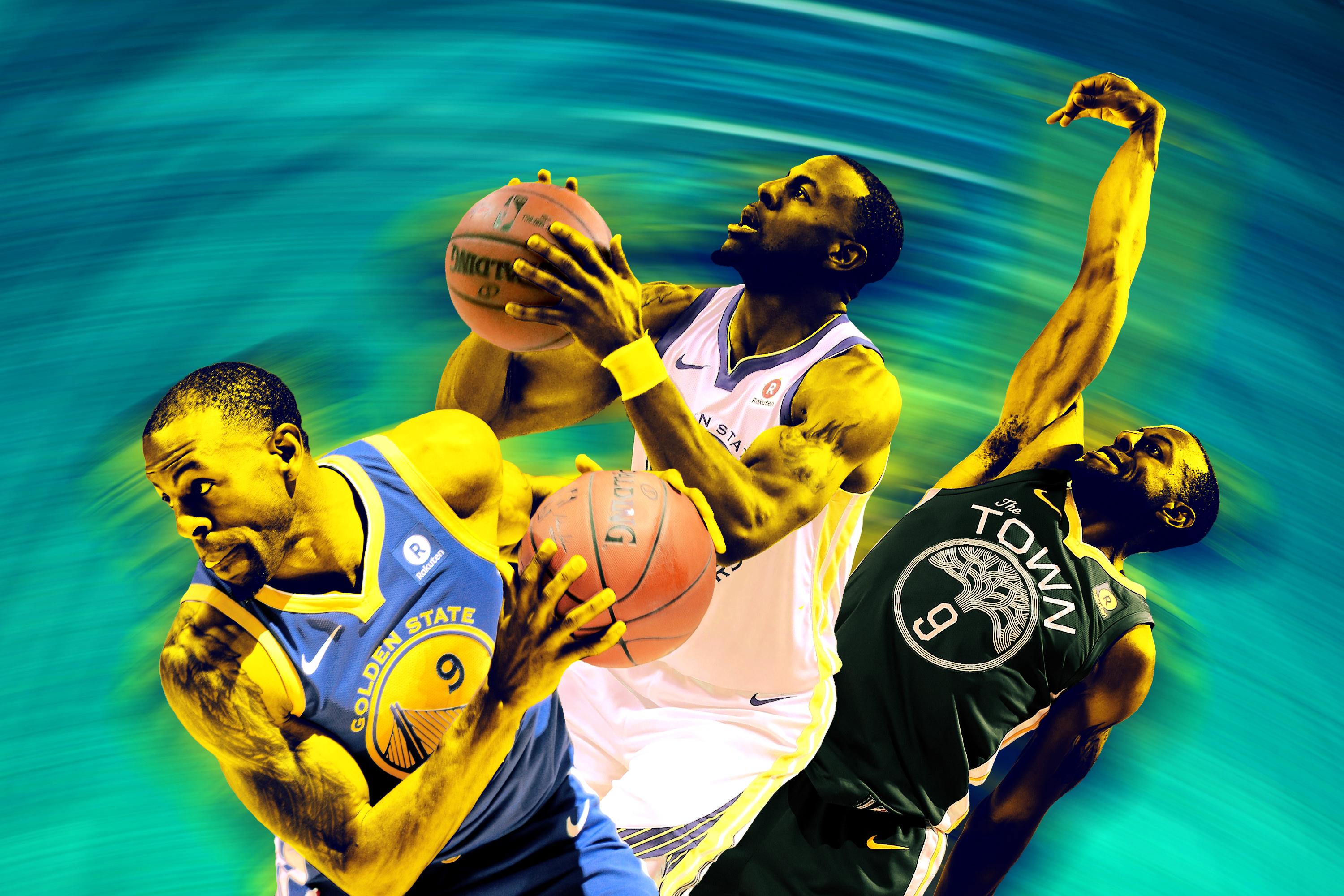
Andre Iguodala flipped a switch in the playoffs. After a terrible regular season in which he put up the worst per-game numbers of his career, the 34-year-old swingman has been a different player over the past month. He has started all but one game for the Warriors in the postseason and has the highest net rating (plus-16.4) of any player in their rotation. Iguodala is the ultimate role player, a guy who defends all five positions and creates easy shots for his more celebrated teammates. It’s a role he’s been overqualified for since he joined the Warriors in 2013. Golden State is unbeatable when he is on his game; that’s the version of Iguodala the Warriors will need to beat the Rockets in the Western Conference finals.
Even if Iguodala doesn’t start Game 1, he’ll be on the floor at the end. He began the playoffs filling in for the injured Steph Curry, before returning to the bench when Curry was ready to start Game 3 of their second-round series with the Pelicans. That lasted one game, as Warriors head coach Steve Kerr moved him back in the starting lineup following a 19-point New Orleans victory. Going small with Draymond Green at the 5 and starting Iguodala is the glass box that Kerr breaks in case of emergency, whether in the team’s second-round series against Memphis in 2015 or the 2015 and 2016 Finals against Cleveland.
A fully engaged Iguodala is still one of the best defensive wings in the NBA. At 6-foot-6 and 215 pounds with a 6-foot-11 wingspan, he has a prototypical combination of length, quickness, and core strength for a perimeter defender. He’s no longer quite as fast as he was in his prime, but he makes up for it with an astounding basketball IQ. Iguodala is almost always in the right position. He anticipates what the offense will do, directs traffic, and covers for his teammate’s mistakes. After 14 years in the NBA, he’s just no longer capable of giving that much effort over the course of an entire season.
If the first two rounds of the playoffs are any indication, Iguodala was playing possum for most of the last nine months. He filled gaps all over the floor against the Spurs and Pelicans, stoning LaMarcus Aldridge in the post on switches and making Nikola Mirotic a nonfactor in the Warriors’ second-round series. With Golden State going small in games 4 and 5 against the Pelicans, Iguodala got the assignment on Mirotic, holding him to 9.5 points and 1.5 assists on 31.3 percent shooting in those games. The stretch big man couldn’t create an advantage on Iguodala, who blanketed Mirotic all over the floor and forced him into tough fadeaways.
Iguodala will need to be even better against the Rockets, since he will spend most of the series on either James Harden or Chris Paul. Everything in Houston goes through its two stars, who spend entire games running pick-and-rolls with three shooters spotting up on the 3-point line. Golden State will use a number of defensive strategies to slow them down, and Iguodala will be crucial to all of them. He needs to hold up in isolations against Paul and Harden, fight over screens to prevent them from attacking weaker defenders like Curry, and switch to keep Clint Capela from dominating him inside.
Iguodala isn’t just a defensive specialist, though. He’s a point forward who serves as a secondary ball handler in Kerr’s free-flowing offense. He leads the team with a sterling 3.3-to-1 assist-to-turnover ratio, and he’s the stabilizing force for a group that can get into trouble trying to force passes that aren’t there. There’s nothing flashy about his game: Iguodala is a patient player who understands his role, reads the floor, and makes the simple play. He can single-handedly change the tempo by cleaning the defensive glass, pushing the ball up the court, and finding an open shooter.
My favorite Iguodala play from this year’s playoffs happened during Game 4 against New Orleans, a sequence that topped off a 17-4 opening run that put the Warriors firmly back in control of the series. The ball is swung to a wide-open Iguodala at the top of the key. The defense is scrambling, but no one comes out to contest his shot. He stands there for a second, surveys the court, and points at Klay Thompson and tells him to get out of the corner. Curry then cuts into the spot that Thompson vacated, and Iguodala hits him with an on-time pass for a wide-open 3:
There’s nothing particularly difficult about what Iguodala did, which is exactly the point. His job isn’t very hard when he’s sharing the floor with four All-Stars. Defenses don’t guard him, so the ball often winds up in his hands. He’s never been a great 3-point shooter, and he shot only 28.2 percent from 3 in the regular season. He’s knocked down enough in the playoffs (11-of-29) to make them pay for that strategy, but the Rockets will almost certainly dare him to make more. The shot is always the last resort for Iguodala in those situations, because he can usually find a better option to take one.
He’s in the perfect spot for a guy at this stage of his career. Kerr rationed his minutes carefully during the season, knowing that nothing matters for Golden State until the playoffs. Even when he’s on the floor, he doesn’t have to do much on offense beyond knock down open shots and get the ball to one of the Warriors’ stars. Iguodala hasn’t played a single minute in the playoffs without at least one of their Big Four. It’s a far cry from his days in Philadelphia, when he was asked to carry the load for a team that won one playoff series in his first eight seasons in the NBA.
None of this happened by accident. Iguodala caught a glimpse of the future in 2013 during a playoff series against the Warriors as a part of a 57-win Nuggets team. That was the year Curry, Thompson, and Green made their playoff debuts, shooting Denver out of the first round. He knew immediately that something was different about them, as he told Marcus Thompson II of The Athletic: “They had nothing to lose and [former Warriors coach] Mark Jackson had them playing like that. ... That’s when I saw that these dudes playing for him look different. I know what an NBA player looks like and I know how they’re being coached based on their expressions and the way they move. They just loved playing basketball.”
When Iguodala hit free agency that offseason, he recruited the Warriors as much as they recruited him. “Before we could say too much, he was telling us how much he admired our team, he admired our coach and our players,” Golden State GM Bob Myers said in 2013. “We said, ‘Do we have to sell you on anything?’ He said, ‘Look, I feel like this is the place I want to play.’ … He was looking at a team that was financially strapped with arguably no way to get him.” Iguodala waited out Dwight Howard, whom the Warriors were also pursuing, refusing offers for more money as they figured out how to clear cap space to sign him.
Iguodala was just as savvy when he hit free agency last offseason. The Warriors were looking to cut costs, so he forced their hand by negotiating with the Rockets. Golden State wound up giving him a three-year, $48 million contract, with Durant facilitating the deal by taking less money himself. Houston signed P.J. Tucker and Luc Mbah a Moute instead, but neither is as comfortable making plays as Iguodala, an issue that could raise its head in this series.
There’s no one like Iguodala on the Rockets’ roster. Paul and Harden are averaging a combined 13.8 assists in the playoffs. No one else gets more than 1.6. Houston counts on its stars to be so dominant offensively that it creates open shots for its supporting cast. The Warriors’ stars, on the other hand, have role players like Iguodala who make plays for them. The best version of Iguodala makes his stars better and the other team’s stars worse. He slowed down LeBron James just enough in the 2015 and 2017 Finals, and he helped hold Durant and Russell Westbrook in check in the 2016 Western Conference finals.
Golden State has more star power than any other team in the NBA. There’s nothing anyone can do if its role players are better, too. Iguodala is the best kind of supporting teammate: a former star who has taken a step back for the good of the team. He has the same role that a 37-year-old Jason Kidd had for the 2011 champion Dallas Mavericks. Iguodala won’t be that age until 2021. Kerr recently called him a future Hall of Famer, and he could finish his career with an incredible résumé: a Finals MVP, an All-Star berth, an Olympic gold medal, and a whole lot of championships. A team should be unbeatable when its fifth option is a potential Hall of Famer.


